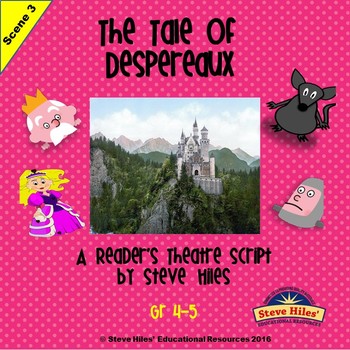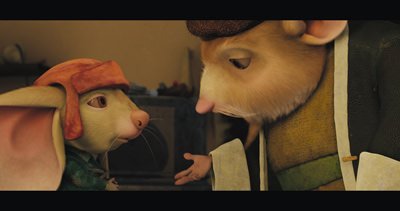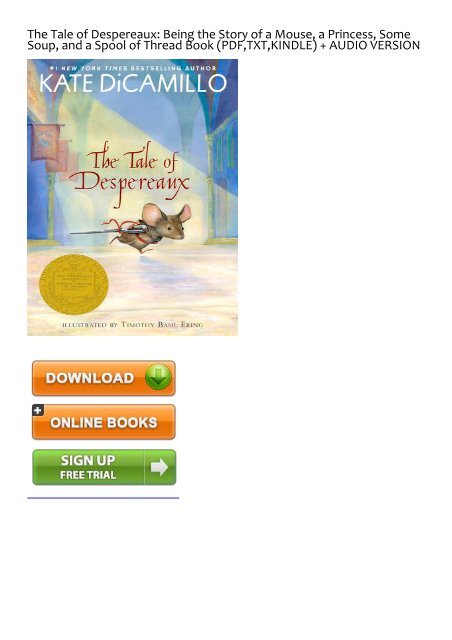“Come closer,” she said. “I don’t aim to hurt you. I promise.”
Despereaux sniffed. The soup smelled wonderful, incredible. Keeping one eye on Cook, he stepped out from behind the spool of thread and crept closer.
“Go on,” said Cook, “taste it.”
Despereaux stepped onto the saucer. Soup covered his paws. He bent his head to the hot broth. He sipped. Oh, it was lovely. Garlic and chicken and watercress, the same soup that Cook had made the day the queen died.
“How is it?” asked Cook anxiously.
“Wonderful,” said Despereaux.
“Too much garlic?” said Cook, wringing her fat hands.
“No,” said Despereaux. “It’s perfect.”
Cook smiled. “See?” she said. “There ain’t a body, be it mouse or man, that ain’t made better by a little soup.”
Despereaux bent his head and sipped again, and Cook stood over him and smiled, saying, “It don’t need a thing, then? Is that what you’re saying? It’s just right?”
Despereaux nodded.
He drank the soup in big, noisy gulps. And when he stepped out of the saucer, his paws were damp and his whiskers were dripping and his stomach was full.
Cook said to him, “Not done already, are you? Surely you ain’t done. You must want more.”
“I can’t,” said Despereaux. “I don’t have time. I’m on my way to the dungeon to save the princess.”
“Ho-hee.” Cook laughed. “You, a mouse, are going to save the princess?”
“Yes,” said Despereaux, “I’m on a quest.”
“Well, don’t let me stand in your way.”
And so it was that Cook held open the door to the dungeon while Despereaux rolled the spool of thread through it. “Good luck,” she said to him. “Ho-hee, good luck saving the princess.”
She closed the door behind her and then leaned against it and shook her head. “And if that ain’t an indicator of what strange days these are,” she said to herself, “then I don’t know what is. Me. Cook. Feeding a mouse soup and then wishing him good luck in saving the princess. Oh my. Strange days, indeed.”
DESPEREAUX STOOD at the top of the dungeon stairs and peered into the darkness that waited for him below.
“Oh,” he said, “oh my.”
He had forgotten how dark the dark of the dungeon could be. And he had forgotten, too, its terrible smell, the stench of rats, the odor of suffering.
But his heart was full of love for the princess and his stomach was full of Cook’s soup and Despereaux felt brave and strong. And so he began, immediately and without despair, the hard work of maneuvering the spool of thread down the narrow dungeon steps.
Down, down, down went Despereaux Tilling and the spool of thread. Slowly, oh so slowly, they went. And the passage was dark, dark, dark.
“I will tell myself a story,” said Despereaux. “I will make some light. Let’s see. It will begin this way: Once upon a time. Yes. Once upon a time, there was a mouse who was very, very small. Exceptionally small. And there was a beautiful human princess whose name was Pea. And it so happened that this mouse was the one who was selected by fate to serve the princess, to honor her, and to save her from the darkness of a terrible dungeon.”
This story cheered up Despereaux considerably. His eyes became accustomed to the gloom, and he moved down the stairs more quickly, more surely, whispering to himself the tale of a devious rat and a fat serving girl and a beautiful princess and a brave mouse and some soup and a spool of red thread. It was a story, in fact, very similar to the one you are reading right now, and the telling of it gave Despereaux strength.
He pushed the spool of thread with a great deal of gusto. And the thread, eager, perhaps, to begin its honorable task of aiding in the saving of a princess, leapt forward and away from the mouse and went down the dungeon stairs ahead of him, without him.
“No,” cried Despereaux, “no, no, no!” He broke into a trot, chasing the thread through the darkness.
But the spool had a head start. And it was faster. It flew down the dungeon stairs, leaving Despereaux far behind. When it came to the end of the stairs, it rolled and rolled, until finally, lazily, it came to a stop right at the gnarled paw of a rat.
“What have we here?” said the one-eared rat to the spool of thread.
“I will tell you what we have,” said Botticelli Remorso, answering his own question. “We have red thread. How delightful. Red thread means one thing to a rat.”
He put his nose up in the air. He sniffed. He sniffed again. “I smell . . . could it be? Yes, most definitely it is. Soup. How strange.” He sniffed some more. “And I smell tears. Human tears. Delightful. And I also detect the smell” — he put his nose high into the air and took a big whiff — “of flour and oil. Oh my, what a cornucopia of scents. But below it all, what do I smell? The blood of a mouse. Unmistakably, mouse blood, yes. Ha-ha-ha! Exactly! Mouse.”
Botticelli looked down at the spool of thread and smiled. He gave it a gentle push with one paw.
“Red thread. Yes. Exactly. Just when you think that life in the dungeon cannot get any better, a mouse arrives.”
DESPEREAUX STOOD TREMBLING on the steps. The thread was most definitely gone. He could not hear it. He could not see it. He should have tied it to himself when he had the chance. But it was too late now.
Despereaux’s dire situation suddenly became quite clear to him. He was a two-ounce mouse alone in a dark, twisting dungeon full of rats. He had nothing but a sewing needle with which to defend himself. He had to find a princess. And he had to save her once he found her.
“It’s impossible,” he said to the darkness. “I can’t do it.”
He stood very still. “I’ll go back,” he said. But he didn’t move. “I have to go back.” He took a step backward. “But I can’t go back. I don’t have a choice. I have no choice.”
He took one step forward. And then another.
“No choice,” his heart beat out to him as he went down the stairs, “no choice, no choice, no choice.”
At the bottom of the stairs, the rat Botticelli sat waiting, and when Despereaux stepped from the last stair onto the dungeon floor, Botticelli called out to him as if he were a long-lost friend. “Ah,” said Botticelli, “there you are. Exactly. I’ve been waiting for you.”
Despereaux saw the dark shape of a rat, that thing that he had feared and dreaded for so long, finally step out of the gloom and come to greet him.
“Welcome, welcome,” said Botticelli.
Despereaux put his paw on the needle.
“Ah,” said Botticelli, “you are armed. How charming.” He put his paws up in the air. “I surrender. Oh, yes, certainly, exactly, I surrender!”
“I . . .,” said Despereaux.
“Yes,” said Botticelli. “You.” He took the locket from around his neck. He began to swing it back and forth. “Please, go on.”
“I don’t want to hurt you,” said Despereaux. “I just need to get by you. I . . . I am on a quest.”
“Really?” said Botticelli. “How extraordinary. A mouse on a quest.” Back and forth, back and forth went the locket. “A quest for what?”
“A quest to save the princess.”
“The princess,” said Botticelli, “the princess, the princess. Everything seems to be about the princess these days. The king’s men were down here searching for her, you know. They didn’t find her. That goes without saying. But now a mouse has arrived. And he is on a quest to save the princess.”
“Yes,” said Despereaux. He took a step to the left of Botticelli.
“How inspiring,” said Botticelli. He lazily took a step to his right, blocking Despereaux’s way. “Why the hurry, little friend?”
“Because,” said Despereaux, “I have to —”
“Yes. Yes. You have to save the princess. Exactly. But before you save her, you must find her. Correct?”
“Yes,” said Despereaux.
“What if,” said Botticelli, “what if I to
ld you that I know exactly where the princess is? What if I told you that I could take you right directly to her?”
“Ummm,” said Despereaux. His voice shook. His paw on the needle trembled. “Why would you do that?”
“Why would I do that? Why would I help you? Why . . . to be of service. To do my part for humanity. To aid in the saving of a princess.”
“But you are a . . .”
“A rat,” supplied Botticelli. “Yes. I am a rat. And I see by your trem-trem-trembling that the greatly exaggerated rumors of our evil nature have reached your oversize ears.”
“Yes,” said Despereaux.
“If,” said Botticelli, swinging the locket back and forth, “if you allow me to be of assistance, you will be doing me a tremendous favor. Not only can I do a good deed for you and for the princess, but my actions will help to dispel this terrible myth of evil that seems to surround rats everywhere. Will you let me assist you? Will you let me assist myself and my kind?”
Reader, was it a trick?
Of course it was!
Botticelli did not want to be of service. Far from it. You know what Botticelli wanted. He wanted others to suffer. Specifically, he wanted this small mouse to suffer. How best to do that?
Why, take him right directly to what he wanted. The princess. Let him see what his heart desired, and then, and only then, faced with what he loved, would Despereaux die. And at the end of it all, how tasty the mouse would be . . . seasoned with hope and tears and flour and oil and thwarted love!
“My name, little friend, is Botticelli Remorso. And you may trust me. You must trust me. Will you tell me your name?”
“Despereaux. Despereaux Tilling.”
“Despereaux Tilling, take your paw from your weapon. Come with me.”
Despereaux stared at him.
“Come, come,” said Botticelli, “let go of your needle. Take hold of my tail. I will lead you to your princess. I promise.”
What, reader, in your experience is the promise of a rat worth?
That’s right.
Zero. Zip. Nada. Goose eggs.
But I must ask you this question, too. What else was there for Despereaux to hold on to?
You are right again.
Nothing.
And so the mouse reached out. He took hold of the rat’s tail.
HAVE YOU EVER had hold of the tail of a rat? At best, it is an unpleasant sensation, scaly and cold, similar to holding on to a small, narrow snake. At worst, when you are dependent upon a rat for your survival, and when a part of you is certain that you are being led nowhere except to your death, it is a hideous sensation, indeed, to have nothing but a rat’s tail to cling to.
Nonetheless, Despereaux held on to Botticelli Remorso. And the rat led him deeper and deeper into the dungeon.
Despereaux’s eyes had, by this point, adjusted quite well to the darkness, though it would have been better if they had not, for the things he saw made him shiver and shake.
What did he see?
He saw that the floor of the dungeon was littered with tufts of fur, knots of red thread, and the skeletons of mice. Everywhere there were tiny white bones glowing in the darkness. And he saw, in the dungeon tunnels through which Botticelli led him, the bones of human beings, too, grinning skulls and delicate finger bones, rising up out of the darkness and pointing toward some truth best left unspoken.
Despereaux closed his eyes.
But it didn’t help. He saw as if his eyes were still open wide the bones, the tufts of hair, the knots of thread, the despair.
“Ha-ha, exactly!” Botticelli laughed as he negotiated the twists and turns. “Oh, yes, exactly.”
If what was in front of Despereaux was too horrible to contemplate, what followed behind him was, perhaps, even worse: rats, a happy, hungry, vengeful parade of rats, their noses up in the air, sniffing, sniffing.
“Mouse!” sang out one rat joyfully.
“Yes, oh, yes, mouse,” agreed another. “But something else, too.”
“Soup!” called out another rat.
“Yes, soup,” the others agreed.
“Blood!” sang a rat.
“Blood,” they all agreed together.
And then they sang: “Here, mousie, mousie, mousie! Here, little mousie!”
Botticelli called out to the other rats. “Mine,” he said. “This little treasure is all mine, gentlemen and ladies. Please, I beg you. Do not infringe on my discovery.”
“Mr. Remorso,” said Despereaux. He turned and looked behind him and saw the rats, their red eyes and their smiling mouths. He closed his eyes again. He kept them closed. “Mr. Remorso!” he shouted.
“Yes?” said Botticelli.
“Mr. Remorso,” said Despereaux. And he was crying now. He couldn’t help it. “Please. The princess.”
“Tears!” shouted the rats. “We smell tears, mousie, we do.”
“Please!” shouted Despereaux.
“Little friend,” said Botticelli. “Little Despereaux Tilling. I promised you. And I will keep that promise.”
The rat stopped.
“Look ahead of you,” he said. “What do you see?”
Despereaux opened his eyes.
“Light,” he said.
“Exactly,” said Botticelli. “Light.”
AGAIN, READER, we must go backward, before we go forward. We must consider, for a moment, what had occurred with the rat and the serving girl and the princess down in the dungeon before Despereaux made his way to them.
What happened was this: Roscuro led the Pea and Mig deep into the dungeon to a hidden chamber, and there he directed Mig to put the princess in chains.
“Gor,” said Mig, “she’s going to have a hard time learning her lessons if she’s all chained up-like.”
“Do as I say,” said Roscuro.
“Maybe,” said Mig, “before I lock her up, her and me could switch outfits, so we could start in already with her being me and me being a princess.”
“Oh, yes,” said Roscuro. “Certainly. A wonderful idea, Miss Miggery. Princess, take off your crown and give it to the serving girl.”
The Pea sighed and took off her crown and handed it to Mig, and Mig put it on and it slid immediately right down her small head and came to rest, quite painfully, on her poor, abused ears. “It’s a biggish thing,” she said, “and painful-like.”
“Well, well,” said Roscuro.
“How do I look?” Mig asked, smiling at him.
“Ridiculous,” he said. “Laughable.”
Mig stood, blinking back tears. “You mean I don’t look like a princess?” she said to the rat.
“I mean,” said Roscuro, “you will never look like a princess, no matter how big a crown you put on your tiny head. You look exactly like the fool you are and always will be. Now, make yourself useful and chain the princess up. Dress-up time is over.”
Mig sniffed and wiped at her eyes and then bent to look at the pile of chains and locks on the floor.
“And now, Princess,” he said, “I’m afraid that the time for your truth has arrived. I will now tell you what your future holds. As you consigned me to darkness, so I consign you, too, to a life spent in this dungeon.”
Mig looked up. “Ain’t she going upstairs to be a serving maid?”
“No,” said Roscuro.
“Ain’t I going to be a princess, then?”
“No,” said Roscuro.
“But I want to be a princess.”
“No one,” said Roscuro, “cares what you want.”
As you know, reader, Miggery Sow had heard this sentiment expressed many times in her short life. But now, in the dungeon, it hit her full force: The rat was right. No one cared what she wanted. No one had ever cared. And perhaps, worst of all, no one ever would care.
“I want!” cried Mig.
“Shhhh,” said the princess.
“Shut up,” said the rat.
“I want . . .,” sobbed Mig. “I want . . . I want . . .”
“What d
o you want, Mig?” the princess said softly.
“Eh?” shouted Mig.
“What do you want, Miggery Sow?!” the princess shouted.
“Don’t ask her that,” said Roscuro. “Shut up. Shut up.”
But it was too late. The words had been said; the question, at last, had been asked. The world stopped spinning and all of creation held its breath, waiting to hear what it was that Miggery Sow wanted.
“I want . . .,” said Mig.
“Yes?” shouted the Pea.
“I want my ma!” cried Mig, into the silent, waiting world. “I want my ma!”
“Oh,” said the princess. She held out her hand to Mig.
Mig took hold of it.
“I want my mother, too,” said the princess softly. And she squeezed Mig’s hand.
“Stop it!” shouted Roscuro. “Chain her up. Chain her up.”
“Gor,” said Mig, “I ain’t going to do it. You can’t make me do it. I got the knife, don’t I?” She took the knife and held it up.
“If you have any sense at all,” said Roscuro, “and I heartily doubt that you do, you will not use that instrument on me. Without me, you will never find your way out of the dungeon, and you will starve to death here, or worse.”
“Gor,” said Mig, “then lead us out now, or I will chop you up into little rat bits.”
“No,” said Roscuro. “The princess shall stay here in the darkness. And you, Mig, will stay with her.”
“But I want to go upstairs,” said Mig.
“I’m afraid that we are stuck here, Mig,” shouted the princess, “unless the rat has a change of heart and decides to lead us out.”
“There will be no changes of heart,” said Roscuro. “None.”
“Gor,” said Mig. She lowered the knife.
And so, the rat and the princess and the serving girl sat together in the dungeon as, outside the castle, the sun rose and moved through the sky and sank to the earth again and night fell. They sat together until the candle had burned out and another one had to be lit. They sat together in the dungeon. They sat. And sat.
Tale Despereaux Ebook Pdf




Tale Despereaux Ebook Online

Tale Of Despereaux Online Book
The Tale of Despereaux takes place in a castle with all the familiar trappings – king, princess, dungeon, jailer, ratsand mice. Our protagonist is a mouse. And here is where things get interesting. Some of DiCamillo’s characters are iconoclasts. Despereaux for sure. The princess for another. Despereaux saw the dark shape of a rat, that thing that he had feared and dreaded for so long, finally step out of the gloom and come to greet him. “Welcome, welcome,” said Botticelli. The Tale of Despereaux: Being the Story of a Mouse, a Princess, Some Soup, and a Spool of Thread - Ebook written by Kate DiCamillo. Read this book using Google Play Books app on your PC, android, iOS devices. Download for offline reading, highlight, bookmark or take notes while you read The Tale of Despereaux: Being the Story of a Mouse, a Princess, Some Soup, and a Spool of Thread. This is the story of Desperaux Tilling, a mouse in love with music, stories, and a princess named Pea. It is also the story of Miggery Sow, a slow-witted serving girl with a simple, impossible wish. These characters are about to embark on a journey that will lead them down into a horrible dungeon, u. A brave mouse, a covetous rat, a wishful serving girl, and a princess named Pea come together in Kate DiCamillo's Newbery Medal–winning tale.Welcome to the story of Despereaux Tilling, a mouse who is in love with music, stories, and a princess named Pea. It is also the story of a rat called Ro.